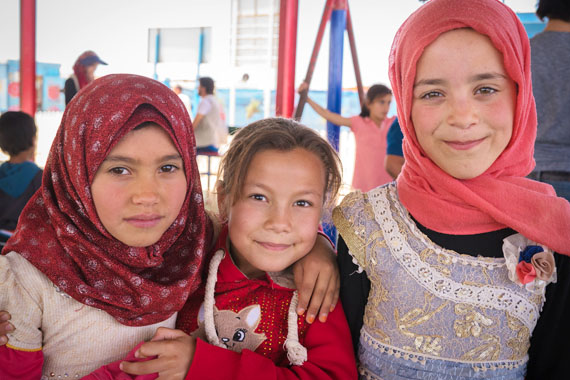| How we’re building resilience from one generation to the next ▸ |

In this era of COVID-19, most of us have experienced new kinds of stress. Adults and kids are coping with separation from friends. If we live in a family household, we may be adjusting to new routines at home together. Perhaps we find ourselves in closer quarters, figuring out ways to share resources of time and space (or internet bandwidth!). All of these changes can have an effect on our well-being. I see these same stresses affecting Syrian refugee families and host communities, here in Jordan’s Azraq and Zaatari camps, where I work. Lockdowns and school closures due to COVID-19 have added another layer of isolation for families already living in uncertainty. One mother of eight children says they are sharing a single mobile phone to access online education. Young and old are missing out on social interaction. My role is to provide creative ways for caregivers and children in our refugee communities to connect, play and build positive relationships, through what we call "psychosocial support programs." 
Girls in Jordan from the film, Terror and Hope: The Science of Resilience. Mercy Corps programs support the psychosocial health of refugee youth, cultivating their ability to build connections with others through the senses, language, sports, nature and art. (Photo: R. Bourke)
You probably know about Mercy Corps public health response in areas like water and sanitation, or fighting infectious diseases (including Ebola and now COVID-19). You may not know that a key part of our commitment to public health is also our response to social needs. In places where natural disaster or violent conflict have altered lives, our community support programs bolster psychological security for children and families. One reason this work is so important here and now is because of the shared refugee experience of trauma, which often begins with the violent conflict that forced them to flee their homes.
But by educating people about how their brains and bodies may react to prolonged stress, they are empowered to move past the shame that can come with not understanding our physical and emotional response. And by helping individuals draw upon their own bravery and unique capabilities, we are helping them to support their children too, and breaking the trauma cycle. I was recently included in a documentary filmed here in our refugee camp — it’s called Terror and Hope: The Science of Resilience.
In the film, one child trauma specialist (Alexandra Chen) observes how as human beings our first response to an oncoming disease outbreak is to immunize ourselves — when we can — to prevent the spread in any way we can. Yet when there is a potentially stressful experience or situation up ahead, we often do nothing to "immunize" ourselves against the deeply damaging psychological impact of that stress.
Mercy Corps has been working with families in the Syrian refugee camps since they first opened, and continues to provide support for both basic needs and long-term recovery. We attend to the immediate needs of vulnerable communities with resources like clean water, soap or food, while we also build the foundation for a safer, healthier future through jobs, education and psychosocial support.
Sources: UNHCR, and Syrian American Medical Society Foundation via ReliefWeb
If you have recently made a gift to Mercy Corps, please know that your generosity truly makes a difference in the lives of those that need it most, in more than 40 countries across the world. Thank you. Sincerely,
Mercy Corps, Jordan Since our work with youth in Jordan began, Hend has played a key role in the design and establishment of Mercy Corps’ program model, providing training and mentorship on the profound stress and attunement approach with youth and adolescents across Jordan refugee and host communities.
COVID‑19 Update: Mercy Corps teams are working to help the world’s most vulnerable people protect themselves against COVID‑19, meet immediate needs and prepare for the devastating impact of economic shock that will push people further into crisis. You can help today by making a gift to our COVID‑19 Resilience Fund.
|
|||||||||||||||||||||||||||||||
| STAY CONNECTED |
|---|
|
||||||